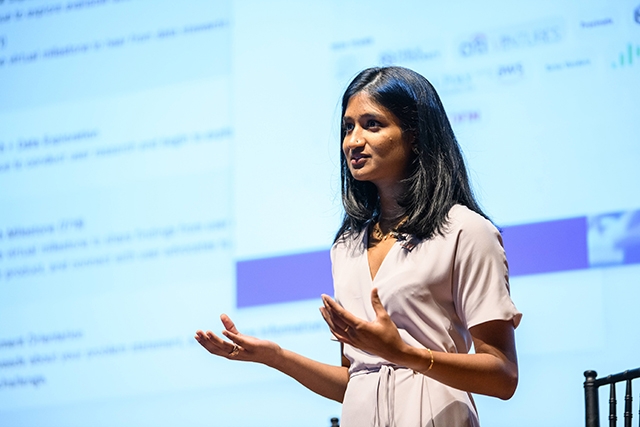News
2019 Civic Digital Fellow Kiran Wattamwar presents her work at Demo Day in Washington, D.C. (Photo provided by Coding it Forward)
The Civic Digital Fellowship is a 10-week program offered by nonprofit Coding it Forward, which places tech students at government agencies, giving them the opportunity to put their skills to use for the public good. Read more about Coding it Forward.
Q. Why did you decide to apply for the Civic Digital Fellowship?
For many, using public sector technology coincides with stressful and major life events. Whether it’s filing disability claims for Social Security, understanding your status in the Coordinated Entry System while experiencing homelessness, or legally changing your gender and name, interacting with government systems often compounds the stress and frustration people might already be experiencing.
Our government provides vital systems that many people depend on. And at its scale and stature, failures in these systems can result in critical harms to those who depend on them most. As our lives become increasingly digital, and the sensitivity of our data only grows, it falls on the public sector to not only build secure and functional services, but to advance our technology policy to protect us from its misuse. As a young technologist, I want to be a part of this.
The Civic Digital Fellowship is a rare opportunity—though my career dreams have long centered on public service, I’ve struggled to find internships within it. CDF creates a pathway for young technologists to engage in technical internships at federal government agencies, while also building a community of seasoned mentors in the civic technology space to support its fellows.
| Applications for the 2021 Civic Digital Fellowships are now open. Click here to learn more and apply by Jan. 24. |
Q. Tell us about your fellowship.
I worked at the Census Open Innovation Labs (COIL) at the Census Bureau. For context, this was in 2019, when the Bureau was ramping up for the decennial 2020 census. It was an incredible opportunity to serve on COIL, a team whose central mission is to steward a culture of inclusion and innovation at Census. As a fellow, I got the chance to work on the content and technical operations of two flagship programs that were in flight that summer.
The first was Census Accelerate, a series of events hosted around the country along with community partners in each area to dispel myths and misinformation about the 2020 census, and engage historically undercounted communities in the process.
The second was The Opportunity Project, a technology accelerator focused on using census data to solve pressing problems by partnering with private companies, individual contributors, and other federal agencies.
Both of these missions aim to share vital information about the census and its data, and served a critical role in mobilizing undercounted communities for the 2020 count.
Q. What were some of the biggest challenges of working on the project and working in tech for a government agency?
My greatest challenge, by far, was navigating the complexity of census misinformation issues, and the ways in which communities have historically been harmed when they were undercounted. The 2020 census was the first online census, and the bureau was undergoing a significant digital transformation with the backdrop of uncertainty stemming from the citizenship question.
Though my work spanned technical implementation, design, and ops, this work was in service to supporting undercounted communities. Technology can build foundations for us to solve large scale problems, but can also serve as the engine that amplifies its unintended consequences. For me, navigating the systemic and social consequences of the census was central to contributing to COIL’s programs from a place of empathy to better serve these communities.
Q. What was the most significant lesson you learned from this experience?
Working at Census exposed me to thickets of rules and processes I did not engage with in my past internships, but it was humbling to be a part of it. The government’s vital services can’t afford to “move fast and break things.” Though it’s important to ensure civic technology continues to advance, this work requires a careful and inclusive approach that serves everyone. Though at times, working within the legacy systems of the census was certainly frustrating, it reaffirmed my motivation to work in civic technology—a refrain I heard often that summer was “government is who shows up.” If we want to see our government’s technology and tech policy improve, technologists must show up.
Q. What advice would you give to students who are thinking of applying?
Go for it! Building enduring technology at a federal level requires not only technical skills, but also thoughtful deliberation, and grit to challenge the way things are done when there’s a better way. If you’ve ever felt frustrated or left out during your own experiences with civic tech, your perspective and participation could meaningfully change them for the better.
Topics: Computer Science
Cutting-edge science delivered direct to your inbox.
Join the Harvard SEAS mailing list.
Press Contact
Adam Zewe | 617-496-5878 | azewe@seas.harvard.edu



